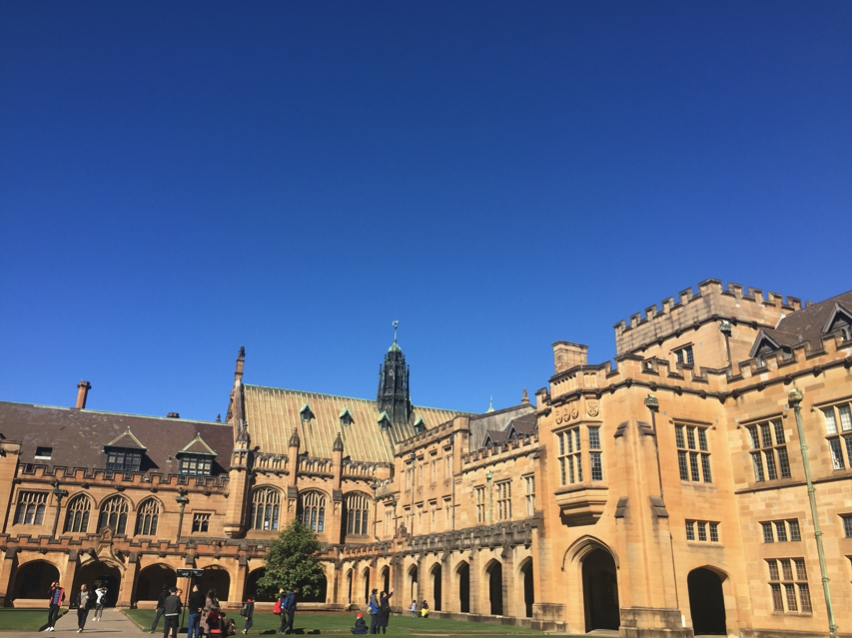How Interning Abroad Gave Me Clarity on My Career Path


My biggest qualm about studying abroad was leaving in the middle of the summer, cutting short any potential resume-building activities. The school year in Australia starts in early August, meaning I had to leave home in July. As I predicted, I wasn’t able to get any meaningful work during my truncated summer. However, the University of Sydney internship course helped me get connected with local host companies looking to hire students and allowed me to get credit for it to boot.
My internship experience was one of my highlights from abroad. I developed rapport with my supervisors and professional skills to carry home with me. I became familiar with the daily rhythm of the city and gained clarity on what I want to do in the future. In this article I will explain the process for getting involved in the internship program, tips for your first day on the job, and my experience working in an office in a foreign country.
Choosing a company:

Once I knew I wanted to participate in an internship while abroad, I scoured through the University of Sydney’s catalog of businesses partnered with the program. The catalog is broken into sections based on the different fields, and I would recommend not narrowing your search too early. Look at any section you have even a mild interest or experience in. You might be able to find a combination of interests or business concept you have never heard of. If possible, look for smaller companies or organizations. The office I worked for employed a total of ten people in the office, so I was given real responsibilities right away. I was even able to work with the Director and other senior management, which I felt gave me a higher-level experience. Smaller or newer organizations may depend even more on interns, and you will be able to get even more integrated in the workplace.
Choose a couple organizations you are interested in, to widen your search and chance of getting hired. Once you have your list, search the website of each one for keywords and try to understand the mission of the organizations. You will need to write a different cover letter for each opportunity, explaining your interests and skills. Remember: you are applying for a placement in a real business, so you will need to sell yourself like you would for any job.
Preparing to go
You will likely be interviewed while you are still in your home country. Prepare for the interview by reading up on the company again and highlight your skills that are applicable. Be confident. Interviewing remotely for a job in a new place can be hard, since you won’t necessarily have a feel for the work culture in that country.
I prepared as I would for any interview in the United States, but I quickly came to learn Australians were much more laidback. During my interview, the director of the company and my future supervisor were both in the office, wearing flannels and jeans. While laidback, they still got down to business and explained the job description and company’s mission to me. I think picking up on their attitudes and matching the friendly tone helped them see I would be a good fit for the office. Try to identify what you think the office culture in that region would be and apply it to your conduct.
For your first day, book some extra time to get to the location. You are still getting used to the transportation system in a new city, and you don’t want to be late for your first day. I even did a trial run the weekend before I started. I took the train to the Central Business District of Sydney, found my future office building, and got a cappuccino nearby. This helped me visualize both the train and walking routes I would be following for work. Being able to recognize the building on my first day made it easier to find my bearings.
Rush hour made the route even busier the next week, and I avoided being lost and late by tracing the route beforehand and planning to leave earlier than I normally would.
Why do an internship abroad?

Interning abroad offers a different perspective on the field you may be interested in. You may have had previous experience in an office in your home country, but the approach to business can vary wildly in a new place. For me, the main cultural differences were how laid-back my coworkers were. They seemed to prioritize making the office an enjoyable place to go, rather than making it a grind. There was no rigid structure, and I struggled at first trying to find direction when little feedback was being offered. Through this, I learned to be more forthcoming in asking for help or feedback and more confident in taking initiative by expanding the scope of my work. I also increased my sense of independence, as the office structure was more self-directed than micro-managed. Beyond the actual work experience I was gaining, I learned important interpersonal skills through navigating the cultural differences in the office.
Having world experience is a plus on any resume, as the job market becomes increasingly international. I developed adaptability as I had to learn quickly after being immersed in a new field. Interning abroad gives a unique chance to practice networking in another part of the world and to learn what it takes to be successful in other areas. Now, I even have contacts in another country, if I ever wanted to move there and get a job.
Interning was one of the highlights of my abroad experience. I started to develop an idea of what I want my career path to look like, by getting experience in a field I didn’t know much about beforehand. I got to experience Sydney from a perspective outside of the traveling student realm.
Liana B. | Economics and Environmental Studies major | Wesleyan University | IFSA University of Sydney Partnership | Fall 2019